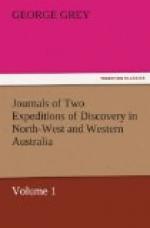The town of Bahia looks very beautiful from the sea; but on entering you find it dreadfully filthy. The stench of the lower town is horrible. Even the President’s palace is a dirty and wretched-looking building: his salary, I understand, is 600 pounds a year. By the last returns the population of the town was 120,000, 100,000 of whom were blacks. All the burdens here are carried by slaves as there are no carts and the breed of horses is small, being perfect ponies.
The exports are cotton and sugar—the cotton chiefly to Liverpool, the sugar to all European countries but England. Their imports are English cotton goods and hardware, also various manufactured goods from Germany. The nuns are famed for the manufacture of artificial feathers and flowers.
The fruit here is excellent, the oranges are particularly fine.
The merchants in the town are principally English and German. There is no American house. Several have started but all who made the attempt have failed.
You cannot penetrate any great distance into the interior as there are no roads but only little pathways through the woods. The Indians are frequently seen very near the town.
State of society.
This part of Brazil offered the curious spectacle of a great evil, which has been long suffered to exist and is now advancing, gradually yet surely, to that state which must entail inevitable destruction on the existing Government of the country. I allude to the immense slave population which, owing to a short-sighted policy, has been allowed to increase so rapidly from the frequent and numerous importations that at the present moment they are in the ratio of 10 to 1 to the white population, to whom they are also, individually, immensely superior in physical strength; the Brazilians being the most insignificant and feeble race of men I have ever yet seen.
Dangers from slave population.
The blacks are perfectly aware of their own power, and about two years ago had arranged a plan for seizing the town and murdering all the whites with the exception of foreigners; which miscarried only by the affair being discovered a few hours before it broke out. This plan was however so wisely and boldly conceived, both as a whole and in detail, that it alone affords the most conclusive evidence that the slave population in this country are by no means deficient either in mental powers or personal courage.
The Brazilians themselves are aware of the danger which threatens them, and yet evince an extraordinary degree of supineness with regard to it. They have indeed framed certain regulations as to the slaves being all within their houses at an early hour of the evening, etc. etc., and these they deem sufficient for their protection; yet to an unprejudiced observer it would appear that, unless some much more effective measures are adopted, within a few years from the present time the whole of this fine country will be in the hands of the blacks: and indeed I think one would be justified in concluding that the moment which produces a person sufficiently intriguing again to stir up the slaves, and endowed with the firmness and talent necessary to conduct an emeute of this nature, will be the last of the Brazilian Empire.




